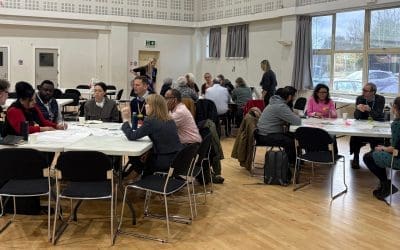Next week (9-15 February) is #HIVTestingWeek. Every year this annual campaign, run by HIV Prevention England, aims to raise awareness about the importance of regular testing, to help reduce the number of people living with undiagnosed HIV and those diagnosed late. The number of people diagnosed with HIV is falling, but there is still work to do.
The UK government has set a goal of achieving zero HIV transmissions and zero HIV-related stigma by the year 2030. How can we achieve this?
Our Sexual Health Service offers free HIV testing as part of its standard sexual infection screening. Testing for HIV is quick and easy – all it takes is a finger-prick test. Testing is really important because people can live with HIV for a long time without any symptoms. Testing is the only way to know your HIV status. If you have HIV, finding out means you can start treatment, stay healthy and avoid passing the virus onto anyone else.
Dr Ayo-ola Okunwobi-Smith, Consultant Genitourinary Medicine and HIV, said: “We can help achieve the goal of zero HIV transmission by 2030 by all of us playing our part – testing, testing, testing and being aware of our HIV status.
“The HIV treatments currently available can’t get rid of HIV completely, but work by reducing the amount of HIV in the body, so the immune system can improve. Once the HIV is undetectable in the blood it is untransmittable. This is known as U=U – i.e., ‘Undetectable = Untransmittable’.”
Dr Smith recorded this interview with Mark, a patient with the HIV service at Hope House, who was diagnosed with HIV in 2015. In this podcast, Mark talks about how his life has been since receiving his diagnosis 10 years ago, the stigma surrounding HIV and how, with the right treatment, he is managing to live a happy and healthy life with the virus.
To find out more about our HIV Service visit: www.hopehouse.nhs.uk/living-with-hiv
Test, Treat, Protect…
Test: It’s a good idea to test at least once a year or following the end of a relationship. Test negative and end worries and doubt. Test positive and you can enjoy a long, healthy life – by testing early and starting treatment in time.
Treat: The sooner someone with HIV starts treatment, the better it is for their health. Treatment can also reduce the amount of HIV in the body to levels at which HIV cannot be passed on.
Protect: Most new infections come from unprotected sex with someone who doesn’t know they have HIV – so aren’t on medication and aren’t undetectable. So we all need to look after ourselves.
Home testing kits
People can also test at home using HIV postal and self-test kits. To find out more, and for further information about the HIV Service, visit the Hope House website>
What’s on this National HIV Testing Week
The team from Hope House HIV Service will be out and about throughout HIV Testing Week offering advice, support and free testing kits. You will find us in the Atrium, Gloucestershire Royal Hospital, Great Western Road, Gloucester from Monday 9 to Friday 13 February.
See below to find out where you can find us:
- Tuesday 10 February: University of Gloucestershire, Oxstalls Campus, Gloucester, 10am-2pm
- Thursday 12 February: Cirencester Livestock Market, Cotswold Agricultural Centre, Driffield Road, Cirencester, 9am-2pm
- Friday 13 February: South Gloucestershire and Stroud College (Stroud Campus), Stratford Road, Stroud, 10am-2pm
The Eddystone Trust
The HIV Service works closely with The Eddystone Trust, which offers support and advice to people living with HIV.. The Trust will also be out in the community running testing sessions throughout #HIVTestingWeek. Find out where they will be here: https://eddystone.org.uk/pages/hiv-testing-week




